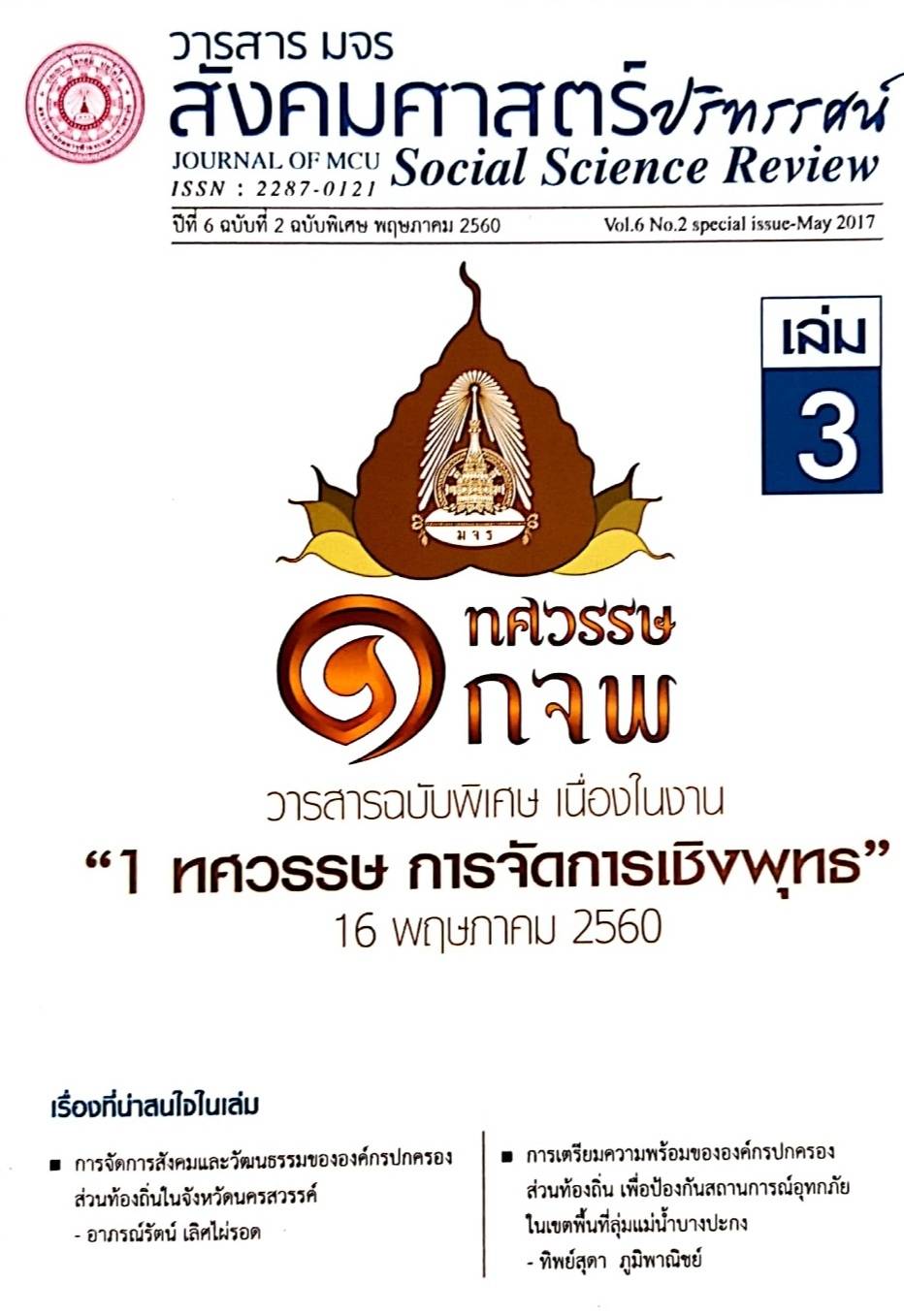การส่งเสริมหลักพุทธธรรมเพื่อการพัฒนาชุมชนดีเด่นในจังหวัดราชบุรี
คำสำคัญ:
การส่งเสริมหลักพุทธธรรม, การพัฒนาชุมชนดีเด่นบทคัดย่อ
การวิจัยครั้งนี้ มีวัตถุประสงค์เพื่อ 1. ศึกษาลักษณะทั่วไปของชุมชนดีเด่นในจังหวัดราชบุรี 2. ศึกษาการพัฒนาชุมชนตามหลักพุทธธรรมและการพัฒนาชุมชนตามหลักวิชาการทั่วไป และ 3. ศึกษาการส่งเสริมหลักพุทธธรรมเพื่อการพัฒนาชุมชนดีเด่นในจังหวัดราชบุรี โดยระเบียบวิธีวิจัยเป็น การวิจัยเชิงคุณภาพ เก็บข้อมูลภาคสนาม จากพระสงฆ์ในพื้นที่ชุมชนดีเด่นจังหวัดราชบุรี ข้าราชการที่เกี่ยวข้องกับการพัฒนาชุมชนจังหวัดราชบุรี ผู้นำชุมชนดีเด่นจังหวัดราชบุรี ราษฎรในชุมชนดีเด่นจังหวัดราชบุรี และนักวิชาการทางพระพุทธศาสนา โดยการเลือกแบบเจาะจง สาหรับการสัมภาษณ์เชิงลึกผู้ให้ข้อมูลสำคัญ จานวน 26 รูป/คน ได้ใช้แบบสัมภาษณ์แบบมีโครงสร้างเป็นเครื่องมือในการเก็บรวบรวมข้อมูล และการสนทนากลุ่มเฉพาะจานวน 9 รูป/คน ได้ใช้แบบบันทึก การสนทนากลุ่มเป็นเครื่องมือในการเก็บรวบรวมข้อมูล และวิเคราะห์ข้อมูลด้วยเทคนิคการวิเคราะห์เนื้อหาประกอบบริบท
ผลการวิจัยพบว่า
1. ลักษณะทั่วไปของชุมชนดีเด่นในจังหวัดราชบุรี พบว่า (1) สภาพชุมชนมีลักษณะเป็นชุมชนเกษตรกรรม (2) ประชาชนส่วนใหญ่นับถือศาสนาพุทธ (3) ประชาชนส่วนใหญ่ยึดถือแนวทางเศรษฐกิจพอเพียงของพระบาทสมเด็จพระเจ้าอยู่หัว รัชกาลที่ 9 มาเป็นแนวทางในการดำเนินชีวิต และ(4) ชุมชนมีความปรองดอง สมานฉันท์ และสามัคคีกัน
- สภาพปัจจุบันของการพัฒนาชุมชนดีเด่นในจังหวัดราชบุรีตามหลักพุทธธรรม พบว่า เป็นการสร้างความเจริญก้าวหน้าแก่ชุมชน โดยมีจุดมุ่งหมายให้ประชาชนและชุมชนมีสภาพความเป็นอยู่ที่ดีขึ้น โดยพิจารณาโครงสร้างพื้นฐานของชุมชน 4 ด้าน ได้แก่ (1) ด้านเศรษฐกิจ (2) ด้านสังคม (3) ด้านการศึกษา และ (4) ด้านสุขอนามัยและสิ่งแวดล้อม ซึ่งการพัฒนาชุมชนตามหลักพุทธธรรมเป็นการส่งเสริมการนาหลักไตรสิกขาไปประยุกต์ใช้ในการพัฒนาชุมชนให้มีความเจริญก้าวหน้าอย่างยั่งยืนประกอบด้วย (1) ศีล คือ การสร้างหลักประกันคุณภาพชีวิต ทรัพย์สิน ครอบครัว สังคม และสุขภาพเพื่อให้เกิดการใช้กาย และวาจาที่ไม่เกิดโทษ (2) สมาธิ คือ การสร้างความสงบทางจิตใจ เพื่อประสิทธิภาพในการคิดพิจารณาตัดสินใจ ตัดสินใจโดยไตร่ตรอง บนพื้นฐานของความไม่ประมาท และ (3)ปัญญา คือ การมีองค์ความรู้ แหล่งเรียนรู้เพื่อพัฒนาความรู้ความเข้าใจ และสามารถถ่ายทอดความรู้สู่ผู้อื่น เพื่อนำไปใช้ในการพัฒนาหรือแก้ไขปัญหาได้อย่างสร้างสรรค์
- แนวทางการส่งเสริมหลักพุทธธรรมเพื่อการพัฒนาชุมชนดีเด่นในจังหวัดราชบุรี พบว่า 3.1ด้านเศรษฐกิจ พบว่า (1) ศีล ได้แก่ การส่งเสริมให้คนในชุมชนทุกสาขาอาชีพมีค่านิยมซื่อสัตย์ไม่ทุจริตฉ้อโกง เป็นต้น (2) สมาธิ ได้แก่ ได้แก่ การส่งเสริมการสร้างสมาธิในการทำงาน เป็นต้น (3) ปัญญาได้แก่ การส่งเสริมให้วัดเป็นที่ตั้งแหล่งเรียนรู้อาชีพแขนงต่าง ๆ เป็นต้น 3.2 ด้านสังคม พบว่า (1) ศีลได้แก่ การส่งเสริมการอยู่ร่วมกันโดยสันติไม่เบียดเบียนทาร้าย เป็นต้น (2) สมาธิ ได้แก่ การส่งเสริมการควบคุมสติให้ตั้งอยู่ในความประมาท เป็นต้น (3) ปัญญา ได้แก่ การส่งเสริมให้วัดเป็นแหล่งเรียนรู้การอยู่ร่วมกันโดยสันติ เป็นต้น 3.3 ด้านการศึกษา พบว่า (1) ศีล ได้แก่ การส่งเสริมกิจกรรมโรงเรียนรักษาศีล5 เป็นต้น (2) สมาธิ ได้แก่ การส่งเสริมการสอนวิธีสร้างสมาธิกับเด็กนักเรียนในสถานศึกษาต่าง ๆ เป็นต้น (3) ปัญญา ได้แก่ การจัดตั้งศูนย์การเรียนรู้วิถีชุมชนที่วัดประจาชุมชน เป็นต้น และ 3.4 ด้านสุขอนามัยและสิ่งแวดล้อม พบว่า (1) ศีล ได้แก่ การส่งเสริมการงดดื่มเครื่องดื่มที่มีแอลกอฮอล์และไม่เกี่ยวข้องกับสิ่งเสพติด เป็นต้น (2) สมาธิ ได้แก่ การส่งเสริมการใช้สติพิจารณาการดาเนินชีวิตประจำวันเป็นต้น และ (3) ปัญญา ได้แก่ การส่งเสริมการจัดตั้งกลุ่มอาสาพัฒนาสุขภาวะและสิ่งแวดล้อมของชุมชนโดยใช้สถานที่ของวัด เป็นต้น
เอกสารอ้างอิง
Kovid Kangsanan. (2556). “Community Management for Sustainable Development” Journal of Politics and Government. Vol. 3 No. 1 (September-February).
Nutchanun Yoosremaruk. (2557). “The Model of Human Resource Development Based on Buddha Dhamma of Public Schools in Bangkok Metropolitan Administration. (Doctoral Dissertation). Bangkok : Mahachulalongkornrajavidyalaya University.
Office of the National Economic and Social Development Board. (2556). The Truth Words of the King for Sustainable Development . Bangkok : Office of the National Economic and Social Development Board.
Pattanasorn Kiatthitikhun. (2557). “A Model of Buddhadhamma Integration for Work Performance Efficiency Development of Bangkok Assistant City Law Enforcement Officers. (Doctoral Dissertation). Bangkok : Mahachulalongkornrajavidyalaya University.
Phradhammapitaka (P.A. Payutto). (2541). Sustainable Development. 3rd ed. Bangkok : Sahadhammika.
Phrakhrunivitsinlakhan (Narong Dhitawatthano). (2557). “Model of Human Capital Development in Line with Buddhadhamma in Local Administrative
Organizations. (Doctoral Dissertation). Bangkok : Mahachulalongkornrajavidyalaya University.
Phrakhruvijitthammanukrak (Somkit yasapaso). (2557). “Buddhadhamma Application for Community Development of Administrative Monks at Region II. (Doctoral Dissertation). Bangkok : Mahachulalongkornrajavidyalaya University.
Ponlawat Chomsook. (2559). "The lifestyle of sufficiency economy philosophy of the people of Isaan". Journal of MCU Social Science Review (Special Edition). Vol. 5 No. 2 (May-August)
Wanmarka Gasondokmai. (2559). “Administration of the Sufficiency Villages: Problems and Discontinuity”. Journal of MCU Social Science Review. Vol. 5 No. 2 (May-August).
ดาวน์โหลด
เผยแพร่แล้ว
รูปแบบการอ้างอิง
ฉบับ
ประเภทบทความ
สัญญาอนุญาต
ลิขสิทธิ์ (c) 2020 วารสาร มจร สังคมศาสตร์ปริทรรศน์

อนุญาตภายใต้เงื่อนไข Creative Commons Attribution-NonCommercial-NoDerivatives 4.0 International License.
เพื่อให้เป็นไปตามกฎหมายลิขสิทธิ์ ผู้นิพนธ์ทุกท่านต้องลงลายมือชื่อในแบบฟอร์มใบมอบลิขสิทธิ์บทความให้แก่วารสารฯ พร้อมกับบทความต้นฉบับที่ได้แก้ไขครั้งสุดท้าย นอกจากนี้ ผู้นิพนธ์ทุกท่านต้องยืนยันว่าบทความต้นฉบับที่ส่งมาตีพิมพ์นั้น ได้ส่งมาตีพิมพ์เฉพาะในวารสาร มจร สังคมศาสตร์ปริทรรศน์ เพียงแห่งเดียวเท่านั้น หากมีการใช้ภาพหรือตารางหรือเนื้อหาอื่นๆ ของผู้นิพนธ์อื่นที่ปรากฏในสิ่งตีพิมพ์อื่นมาแล้ว ผู้นิพนธ์ต้องขออนุญาตเจ้าของลิขสิทธิ์ก่อน พร้อมทั้งแสดงหนังสือที่ได้รับการยินยอมต่อบรรณาธิการ ก่อนที่บทความจะได้รับการตีพิมพ์ หากไม่เป็นไปตามข้อกำหนดเบื้องต้น ทางวารสารจะถอดบทความของท่านออกโดยไม่มีข้อยกเว้นใดๆ ทั้งสิ้น





